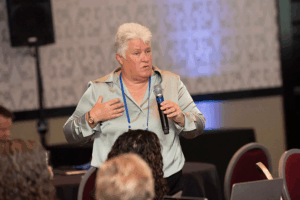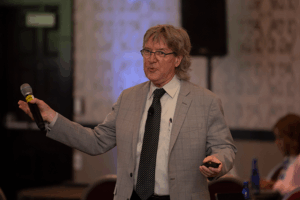Professional regulation: Where aspirational becomes enforceable
“Our new code of ethics comprises core values, and it also has guidelines guiding the practice of social work,” said Barb Whitenect, BA, BSW, MSW, RSW, of the Canadian Association of Social Workers. “It is aspirational.”
Whitenect was the leadoff speaker at ASWB’s 2025 Education Meeting in early May, leading a dynamic discussion with Dale Atkinson, regulatory attorney and ASWB legal counsel. Their preparation for the session hinged on a question from Atkinson: Is the code of ethics enforceable?
When we think of recruitment and retention, the fact that social work is a profession is really important to young people. Young people want to be part of a profession. They want to say, 'I am a professional.' So, the fact that we have a code of ethics that guides our practice, that's a critical component to the professionalization of social work.
 Whitenect, who serves as president of the Canadian Association of Social Workers, discussed the inclusive and intentional process CASW took to develop its revised Code of Ethics, which was published in 2024. She pointed out that a code of ethics is critical for any profession. “When we think of recruitment and retention, the fact that social work is a profession is really important to young people. Young people want to be part of a profession. They want to say, ‘I am a professional.’ So, the fact that we have a code of ethics that guides our practice, that’s a critical component to the professionalization of social work.”
Whitenect, who serves as president of the Canadian Association of Social Workers, discussed the inclusive and intentional process CASW took to develop its revised Code of Ethics, which was published in 2024. She pointed out that a code of ethics is critical for any profession. “When we think of recruitment and retention, the fact that social work is a profession is really important to young people. Young people want to be part of a profession. They want to say, ‘I am a professional.’ So, the fact that we have a code of ethics that guides our practice, that’s a critical component to the professionalization of social work.”
“Maybe [the Code of Ethics] is not enforceable to the fullest capacity, but maybe it should be,” Whitenect said. “And I think that’s where regulation and promotion of the profession can work hand in glove. … We need one voice; we need to work collaboratively with the regulatory piece and the [professional] association piece around promotion of the profession.”
Aspirational guidelines and guardrails in a code of ethics become enforceable through regulation, Atkinson pointed out. “Government is the only entity that can mandate — require something to happen. That certainly helps elevate something to that professional status,” Atkinson said. “Government can mandate. You have to have a driver’s license to lawfully engage in driving an automobile. You have to drive the speed limit. You have to comply with the laws.” Similarly, professional regulation adds enforceable standards to a profession’s aspirational code of ethics. “The enactment of a statute turns an unregulated profession into a regulated profession.”
 “Regulation might involve a lot of [segments of a profession]: academics, practitioners, licensees, regulators, and others.” All those groups also have a vested interest in workforce issues in social work — the recruitment and retention mentioned earlier by Whitenect. “So, what we’re trying to do is lay the foundation for respect for that unified voice, but at the same time recognize some of the differences that might exist, that may be important at times, or may not be important at times,” Atkinson said.
“Regulation might involve a lot of [segments of a profession]: academics, practitioners, licensees, regulators, and others.” All those groups also have a vested interest in workforce issues in social work — the recruitment and retention mentioned earlier by Whitenect. “So, what we’re trying to do is lay the foundation for respect for that unified voice, but at the same time recognize some of the differences that might exist, that may be important at times, or may not be important at times,” Atkinson said.
“So, when Dale said to me, ‘Well, is it enforceable?’ I said, ‘You know what, it should be enforceable,” Whitenect said. “It should be enforceable because we need to follow the inclusiveness, the truth and reconciliation,” in the revised CASW Code of Ethics. “That needs to be our everyday practice.”
“For the regulation of social work in Oregon, and probably in other jurisdictions as well, we have embedded the Code of Ethics [in regulations],” said attendee Kathy Outland, responding to a question from Atkinson. “We have a section that is codified for our jurisdiction, for our social workers… and we use that as a way to sanction, if needed, those folks who don’t follow the code of ethics.”
What we're trying to do is lay the foundation for respect for that unified voice, but at the same time recognize some of the differences that might exist, that may be important at times, or may not be important at times.
In the first session of ASWB’s conference highlighting ways regulation shapes the social work workforce, Whitenect reiterated that professional ethics and enforceable practice standards should be a fundamental point of alignment between professional social work associations and social work regulators.
“The Code of Ethics really legitimizes the profession,” Whitenect said, “and helps situation practice as we work with other health care professionals. … It’s a retention and recruitment tool in my view. Again, it defines the professionalization of social work, and we have protection of the public and the profession, which is critical.”

